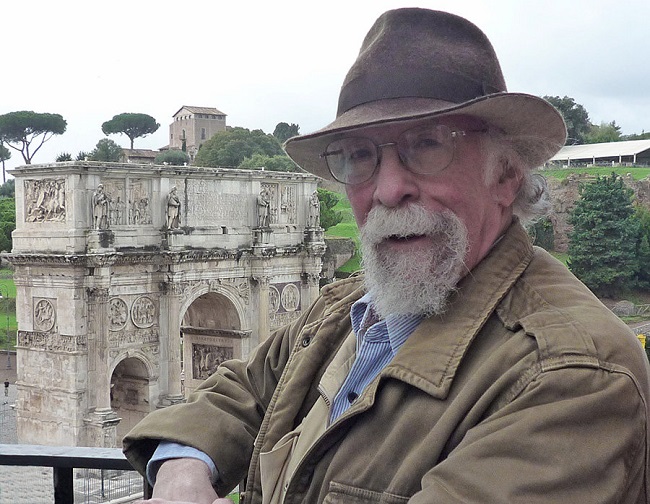A Planetarium Opera
James Dashow: Archimedes
(Neuma Records / December 20, 2021)
- Buy The 3 CD Set
- Listen Digitally
Spacey, intriguing, even educational, the life of Archimedes is celebrated in electronic music, and an opera written for a planetarium by composer James Dashow.
Inspired by laser and electronic music displays that he'd experienced in science museums, electronic music pioneer James Dashow wrote the monumental opera expressly for that venue. Appropriately enough, the opera deals with the life of Archmedes, the ancient Greek mathematician who is, coincidentally, the inventor of the planetarium.
“The opera utilizes always the full surround effect, even when visually the live singers are in the usual positions of traditional theatre, in front of or in the middle of the audience, fixed on a stage. The music keeps the sense of the audience being in the midst of the action, not as outside observers,” says Dashow in a release.
“The synchronization of musical phrases, rhythms, harmonies, textures with their movements around the planetarium (the spatialization) adds a whole new expressive dimension to the musical experience. There is something about experiencing musical events in space, not just in a line across a stage, that is quite moving for the human sensibility.”
It took nine years to assemble the project, which combines live voices, prerecorded instruments, immersive multimedia, and electronic sounds. This release is, essentially, its premiere.
Musically, the work is dramatic and eschews melody, for the most part, in favour of expression. Dashow uses various elements in the structure of the piece. Archimedes is represented by different guitar sounds, and as he matures in the course of the story, the sounds and guitars also change. In track 4 (In Which He Grows Up), children's' voices blend with trippy, high-pitched sounds. By Archimedes At War (in the second act), the timbre is darker and lower, and as ominous as the title would suggest.
Roman proconsul Marcellus' appearance in the opera is depicted by a chamber ensemble, one that grows little by little from four instruments to a small chamber orchestra by the end. When Marcellus and Archimedes meet, in Act III (the third disc), the two musical modes also come together. The tragedy of Archimedes' story is that, after the Siege of Syracuse, his home, Marcellus ordered that he be kept alive - but a Roman soldier killed him anyway.
Along with the music, spoken portions of the libretto tell the details of the story. You may even learn some math along the way. Act II alternates Mathematics with musical choruses dubbed “Then Archimedes”.
 |
| James Dashow |
The cast includes a crew of freelance opera singers based in NYC, including Michael Kelly as Archimedes, Martin Bakari as Marcellus, and Adrian Rosas as Hieron. You'll note the stratospheric pitch of soprano Jennifer Zetlan as the Demiurge, her voice blending with Brian Giebler's tenor.
Musical accompaniment includes the work of recorder virtuoso Antonio Politano, with eleven-year-old Madeleine Albus playing the role of Child. Along with singing, the piece includes spoken word sections, and an introductory narrative by noted Shakesperian actor, Philip Kerr.
The libretto by Cary Plotkin with Ted Weiss is poetic, sometimes funny, sometimes intriguing or philosophical. It's easy to imagine this work performed as it was intended, in an atmospheric planetarium.
The album cover depicts one of Archimedes discoveries - the ratio of the volume of a cylinder to the volume of its circular end (3/2). Dashow used the ratio that Archimedes himself considered his most important.
“This ratio is also that of the perfect fifth in musical terms. Hence, all of his music consists of different selections of the 8 pitches that make up the interval of a perfect fifth, all carefully structured within the constraints of my Dyad System. The very end of the opera has clusters of all eight pitches of a perfect fifth in overlapping clusters that depict Archimedes tragic destiny.”

Comments
Post a Comment